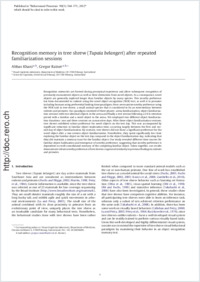Recognition memory in tree shrew (Tupaia belangeri) after repeated familiarization sessions
- Khani, Abbas Visual Cognition Laboratory, Department of Medicine, University of Fribourg, Switzerland - Center for Cognition, University of Fribourg, Switzerland
- Rainer, Gregor Visual Cognition Laboratory, Department of Medicine, University of Fribourg, Switzerland - Center for Cognition, University of Fribourg, Switzerland
-
12.04.2012
Published in:
- Behavioural Processes. - 2012, vol. 90, no. 3, p. 364–371
English
Recognition memories are formed during perceptual experience and allow subsequent recognition of previously encountered objects as well as their distinction from novel objects. As a consequence, novel objects are generally explored longer than familiar objects by many species. This novelty preference has been documented in rodents using the novel object recognition (NOR) test, as well is in primates including humans using preferential looking time paradigms. Here, we examine novelty preference using the NOR task in tree shrew, a small animal species that is considered to be an intermediary between rodents and primates. Our paradigm consisted of three phases: arena familiarization, object familiarization sessions with two identical objects in the arena and finally a test session following a 24-h retention period with a familiar and a novel object in the arena. We employed two different object familiarization durations: one and three sessions on consecutive days. After three object familiarization sessions, tree shrews exhibited robust preference for novel objects on the test day. This was accompanied by significant reduction in familiar object exploration time, occurring largely between the first and second day of object familiarization. By contrast, tree shrews did not show a significant preference for the novel object after a one-session object familiarization. Nonetheless, they spent significantly less time exploring the familiar object on the test day compared to the object familiarization day, indicating that they did maintain a memory trace for the familiar object. Our study revealed different time courses for familiar object habituation and emergence of novelty preference, suggesting that novelty preference is dependent on well-consolidated memory of the competing familiar object. Taken together, our results demonstrate robust novelty preference of tree shrews, in general similarity to previous findings in rodents and primates.
- Faculty
- Faculté des sciences et de médecine
- Department
- Département de Médecine
- Language
-
- English
- Classification
- Biological sciences
- License
- License undefined
- Identifiers
-
- RERO DOC 29589
- DOI 10.1016/j.beproc.2012.03.019
- Persistent URL
- https://folia.unifr.ch/unifr/documents/302472
Statistics
Document views: 80
File downloads:
- rai_rmt.pdf: 243
